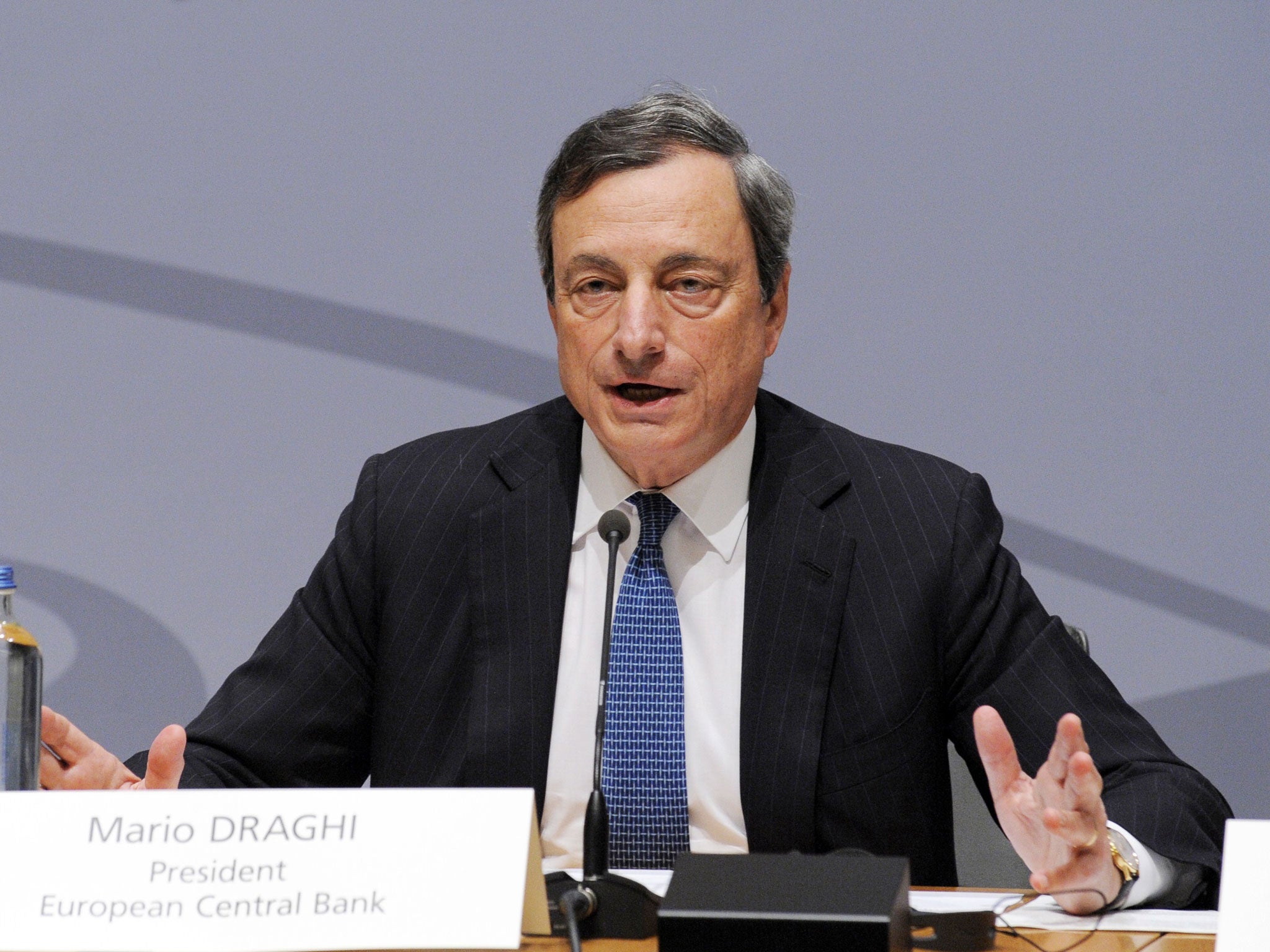European Central Bank imposes negative rates on banks in historic move
European Central Bank also slashed its benchmark interest rate to a new record low

The European Central Bank has become the first major monetary authority to experiment with negative interest rates, reflecting a growing sense of official alarm over the health of the eurozone’s economy.
The Frankfurt-based central bank announced today that it has cut its deposit rate from zero to minus 0.1 per cent. This means commercial banks on the Continent will now be charged to park money with the ECB. Under normal circumstances they would expect to receive interest on these reserves.
The President of the ECB, Mario Draghi, said that the objective of the rate cut was to incentivise commercial banks to repair their profit margins by increasing their loans to European businesses and households. He stressed that more action would be forthcoming if this did not do the trick.
The unprecedented move reflects the fact the Continent has still not recovered from the crisis that pushed the single currency to the brink of collapse two years ago.
The eurozone emerged from recession last year and the borrowing costs of key struggling member states Spain and Italy have retreated dramatically from the emergency highs in the summer of 2012. But growth over the past year has been tepid.
The latest official figures this week showed that the 18-member bloc eked out just 0.2 per cent of growth in the first quarter of 2014, below expectations and a much weaker rate than the rest of the advanced world. Unemployment remains at emergency levels in Greece and Spain and joblessness is still painfully high in France, Ireland and Italy.
But what prompted the ECB to push its deposit rate into uncharted territory is that inflation has slumped. In May, annual consumer price inflation dipped to just 0.5 per cent. That is well below the ECB’s official 2 per cent target and has exacerbated concerns that harmful deflation could take hold on the Continent, just as it did in Japan during the Asian economy’s “lost decade” in the 1990s.
Yet economists were sceptical of how much of a beneficial impact the negative deposit rate for banks would actually have on bank lending volumes. “The practical consequences are very unclear – and will probably remain very limited,” said Holger Schmieding, of Berenberg Bank.
German saver groups expressed their fear that hitting banks’ profits would merely prompt them to cut their interest payments to ordinary savers.
Other economists pointed out that one of the objectives of the ECB was to give the eurozone a competitiveness boost by reducing the value of the single currency on foreign exchanges.
Financial markets had been expecting the monetary easing from the ECB but the euro nevertheless instantly sank 0.3 per cent against the dollar in the wake of the decision, although it later recovered the lost ground.
The single currency also dropped sharply against the pound. “It is clear that a weaker euro will be a critical element in the ECB achieving its inflation target,” said David Bloom, of HSBC.
European stock markets also responded positively to the raft of measures. The German Dax 30 index jumped above the 10,000 level for the first time while the Cac 40 in Paris rose 0.8 per cent shortly after the announcement. “Draghi’s pulled a couple of rabbits out of the hat, which seems to have pleased people,” said Grant Lewis, at Daiwa Capital Markets.
The ECB also reduced its main refinancing rate to a new record low of 0.15 per cent, down from 0.25 per cent.
And it plans to allow eurozone banks to borrow up to €400bn of cheap funds – 7 per cent of their existing loan books in return for extending more credit to borrowers – in a programme similar to the Bank of England’s Funding for Lending scheme.
The ECB also made clear that it was prepared to adopt other measures to bring inflation in the bloc back to target, including implementing the kind of purchases of asset-backed securities undertaken in recent years by the US Federal Reserve.
“Are we finished? The answer is No,” Mr Draghi told reporters, adding that policymakers unanimously agreed to consider more unconventional measures to boost inflation if it stays too low.
Underlining the scale of the economic challenge, the ECB was forced to revise down its growth and inflation forecasts. It now expects growth of just 1 per cent in 2014. By contrast, the UK is forecast to grow by 2.7 per cent this year. The ECB now sees inflation rising to just 1.1 per cent in 2015 and 1.4 per cent in 2016.
Mr Draghi insisted that he does not expect the zone to slip into Japanese-style deflation. “We don’t see deflation. We don’t see a negative spiral of self-fulfilling negative expectations” he said.
Subscribe to Independent Premium to bookmark this article
Want to bookmark your favourite articles and stories to read or reference later? Start your Independent Premium subscription today.

Join our commenting forum
Join thought-provoking conversations, follow other Independent readers and see their replies